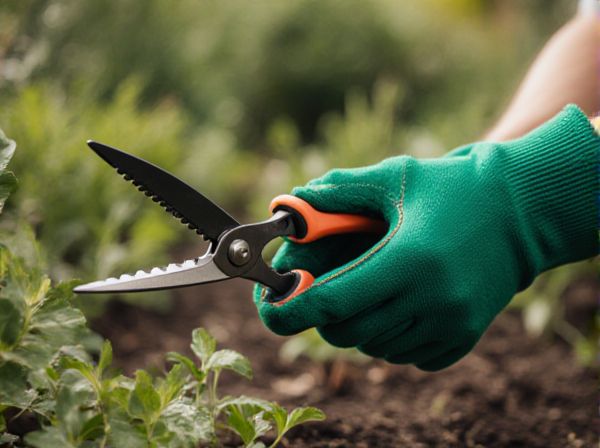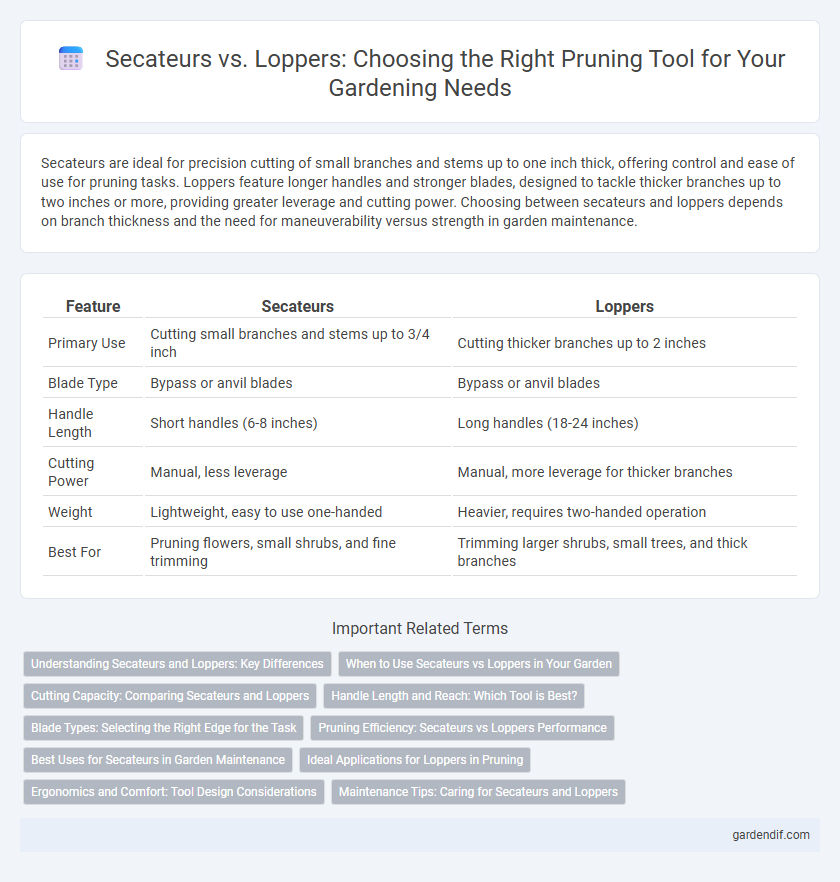
Secateurs vs Loppers Illustration
Secateurs are ideal for precision cutting of small branches and stems up to one inch thick, offering control and ease of use for pruning tasks. Loppers feature longer handles and stronger blades, designed to tackle thicker branches up to two inches or more, providing greater leverage and cutting power. Choosing between secateurs and loppers depends on branch thickness and the need for maneuverability versus strength in garden maintenance.
Table of Comparison
| Feature | Secateurs | Loppers |
|---|---|---|
| Primary Use | Cutting small branches and stems up to 3/4 inch | Cutting thicker branches up to 2 inches |
| Blade Type | Bypass or anvil blades | Bypass or anvil blades |
| Handle Length | Short handles (6-8 inches) | Long handles (18-24 inches) |
| Cutting Power | Manual, less leverage | Manual, more leverage for thicker branches |
| Weight | Lightweight, easy to use one-handed | Heavier, requires two-handed operation |
| Best For | Pruning flowers, small shrubs, and fine trimming | Trimming larger shrubs, small trees, and thick branches |
Understanding Secateurs and Loppers: Key Differences
Secateurs are handheld pruning tools designed for precise cuts on small branches up to 3/4 inch thick, offering maneuverability and ease of use in detailed pruning tasks. Loppers feature longer handles and larger blades, enabling greater leverage to cut thicker branches typically between 1 to 2 inches in diameter with less effort. The primary difference lies in their size, cutting capacity, and intended applications, with secateurs suited for fine trimming and loppers ideal for medium branches requiring more force.
When to Use Secateurs vs Loppers in Your Garden
Secateurs excel at precise pruning tasks, ideal for cutting branches up to 3/4 inch thick and maintaining flowers or small shrubs. Loppers are best suited for handling thicker branches between 1 to 2 inches in diameter, offering greater leverage for tougher cuts. Choose secateurs for detail work and loppers when dealing with larger, woody stems to promote healthy garden growth.
Cutting Capacity: Comparing Secateurs and Loppers
Secateurs typically offer a cutting capacity of up to 3/4 inch in diameter, making them ideal for precision pruning of small branches and stems. Loppers provide a larger cutting capacity, often ranging from 1 to 2 inches, suited for thicker branches and more substantial pruning tasks. Selecting between secateurs and loppers depends on the branch thickness and the specific gardening or landscaping needs.
Handle Length and Reach: Which Tool is Best?
Secateurs typically feature shorter handles, usually around 6 to 8 inches, providing precision and control for detailed pruning tasks. Loppers have longer handles, ranging from 18 to 30 inches, offering enhanced leverage and extended reach, ideal for cutting thicker branches up to 2 inches in diameter. For close, intricate cuts, secateurs excel, while loppers are best suited for accessing higher or deeper branches without ladder use.
Blade Types: Selecting the Right Edge for the Task
Secateurs typically feature bypass blades with sharp, curved edges designed for precise, clean cuts on live, green wood, while loppers often use either bypass or anvil blades suited for thicker, tougher branches. Bypass blades work like scissors, slicing smoothly without crushing plant fibers, ideal for healthy stems, whereas anvil blades crush branches against a flat surface, effective for cutting dead or dry wood. Choosing the appropriate blade type enhances cutting efficiency and plant health during pruning tasks.
Pruning Efficiency: Secateurs vs Loppers Performance
Secateurs offer precision and ease for pruning smaller branches up to 3/4 inch thick, enabling clean cuts that promote healthier plant growth. Loppers excel in cutting thicker branches between 1 to 2 inches in diameter, providing greater leverage and less hand fatigue during extensive pruning tasks. Choosing the right tool directly impacts pruning efficiency, with secateurs suited for detailed trimming and loppers designed for heavy-duty branch removal.
Best Uses for Secateurs in Garden Maintenance
Secateurs are ideal for precise pruning of small branches, stems, and flower cuttings, making them essential for shaping plants and promoting healthy growth. Their sharp blades and ergonomic design enable clean cuts on branches up to 3/4 inch thick, preventing damage and disease spread. Regular use of secateurs improves plant vitality and aesthetics by maintaining proper airflow and sunlight exposure in garden beds.
Ideal Applications for Loppers in Pruning
Loppers are ideal for pruning medium to thick branches ranging from 1 to 2 inches in diameter, making them perfect for orchard maintenance and garden shrub shaping. Their long handles provide extra leverage for cutting through tougher woody stems that secateurs cannot handle efficiently. Loppers excel in accessing hard-to-reach areas, enabling precise cuts that promote healthy plant growth.
Ergonomics and Comfort: Tool Design Considerations
Secateurs feature a compact design with curved handles that fit comfortably in the hand, reducing strain during precision cuts and making them ideal for frequent, repetitive use. Loppers, designed for heavier pruning tasks, incorporate long handles with cushioned grips and angled blades to maximize leverage while minimizing wrist and forearm fatigue. Ergonomic considerations in both tools focus on weight distribution, handle shape, and shock absorption to enhance user comfort and prevent injury during extended gardening sessions.
Maintenance Tips: Caring for Secateurs and Loppers
Regularly clean secateurs and loppers with soapy water to remove sap and debris, preventing rust and ensuring smooth operation. Sharpen blades frequently using a sharpening stone or file to maintain cutting efficiency and reduce plant damage. Lubricate pivot points with light oil to prevent stiffness and check screws for tightness to avoid misalignment or blade wobble.
Secateurs vs Loppers Infographic

 gardendif.com
gardendif.com